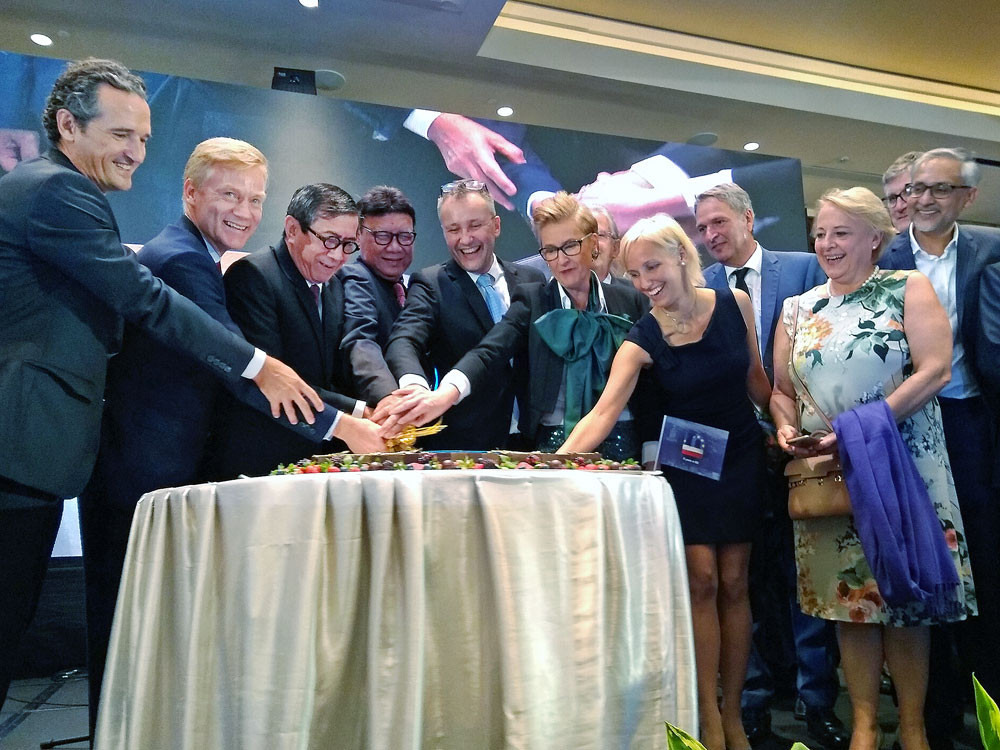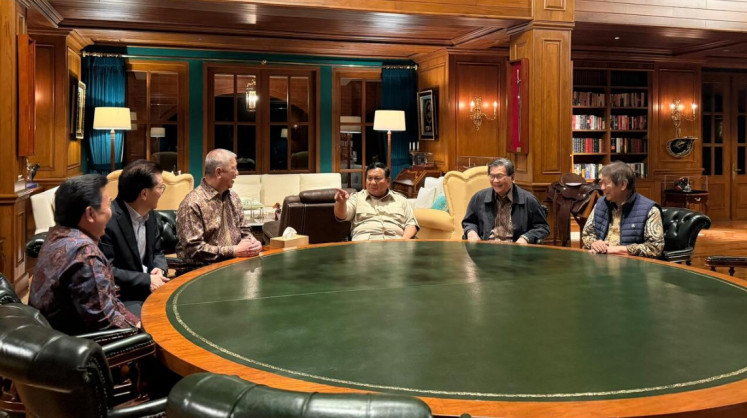Popular Reads
Top Results
Can't find what you're looking for?
View all search resultsPopular Reads
Top Results
Can't find what you're looking for?
View all search resultsEurope-Indonesia relations after European elections
Change text size
Gift Premium Articles
to Anyone
 European Union Ambassador to ASEAN Francisco Fontan (left), EU Ambassador to Indonesia Vincent Guérend (second left) Law and Human Rights Minister Yasonna Laoly (third left) and Home Minister Tjahjo Kumolo (fourth left) cut cake during the celebration of Europe Day in Jakarta. (The Jakarta Post/Dian Septiari)
European Union Ambassador to ASEAN Francisco Fontan (left), EU Ambassador to Indonesia Vincent Guérend (second left) Law and Human Rights Minister Yasonna Laoly (third left) and Home Minister Tjahjo Kumolo (fourth left) cut cake during the celebration of Europe Day in Jakarta. (The Jakarta Post/Dian Septiari)
E
vents in Brussels may seem a distant matter in Jakarta sometimes, but there will be many in Indonesia who will be following carefully the consequences of the recent European Parliament (EP) elections. That vote may have a bigger impact on trade and economic relations between the two powers than may be obvious at first sight.
The parliament has long been considered a bit of a joke in Europe’s political centers of Berlin, Paris and London. It used to be a place where has-been politicians sought to enjoy quiet retirement.
I began my career as a parliamentary aide, frequently lost in the corridors of its two parliaments in Brussels and Strasbourg. But the EP has undergone a profound transformation in the past 25 years.
Once it was an assembly dominated by two blocs — the Christian Democrats and the Social Democrats.
Their hold on votes across the chamber was significant. Their collective working majority meant they could carve up key roles such as committee chairmanships. The smaller parties such as the Liberals, Greens and Independents would then fight it out for the scraps.
The results of the latest European elections have given rise to a very different assembly. The Liberals and Greens made significant gains along with a collection of other minority parties. This has led to much commentary suggesting that European politics is taking a lurch to the right with the rise of parties such as the United Kingdom’s Brexit Party. However, the parliamentary arithmetic tells us a different story.
While nativist parties have claimed electoral success last week, the four largest groups of the EP — including the Greens — remain broadly centrist, pro-European parties.
Where the Christian Democrats and Social Democrats lost seats, the Liberals and Greens gained. In the previous parliament, they held collectively 529 seats; in the new Parliament they have 504 seats.
Moreover, the euroskeptic and anti-European Union populist right comprise 179 members of the EP (MEPs) in the new parliament, compared to 170 MEPs in the old one. MEPs from parties that advocate further and deeper European integration now comprise 72 percent of parliament, compared to 77 percent in the previous one.
As Oscar Wilde might have said, reports of the demise of European centrist politics are greatly exaggerated.
It matters, because parliament has significant powers. An assumption often made is that it is a toothless body.
It is far from that.
Since the Maastricht Treaty in 1992, parliament has accrued considerable control over legislation. It has equal say with EU members state governments on the vast majority of ordinary EU laws relating to the budget, the single market, agriculture, environment and, crucially, trade.
On June 17, Indonesian trade negotiators will sit down with their EU counterparts in Jakarta for an eighth round of negotiations for a free trade agreement. Three years ago EU governments gave the green light for trade negotiations to begin.
The bloc is keen to get the framework of a deal finalized with Jakarta. However, the politics of the new EP is likely to make getting deal finalized and ratified a lot tougher.
A key moment in the coming months will be deciding who replaces a range of top EU jobs. All new 27 European Commissioners nominated by member states will be subject to EP confirmation hearings along with a host of other top jobs, such as the President of the European Council and President of the European Central Bank.
The horse-trading among EU member states has begun, as they jostle to get their preferred people into posts with clout.
One such role up for grabs is the role of the EU’s trade commissioner.
This is one of the most influential political posts in Brussels, and the EP will have a very significant voice in that appointment process. We should expect fireworks.
The new parliament has the political momentum, and MEPs will be looking to flex their muscles and try to cause maximum embarrassment to EU government nominees while, at the same time, maneuvering their own preferred candidates into more prestigious portfolios.
Moreover, the confirmation hearings of the trade commissioner candidate will expose the real divide now in the EU. It is not a divide between populists and democrats.
The trade commissioner hearing is the setting for a fight between protectionists on the one hand, including the emboldened Greens who dislike expanding global trade because of environmental impacts, and free traders on the other, such as Christian Democrats and Liberals.
Populists and anti EU MEPs may well lend their support to the Greens and Social Democrats in resisting further comprehensive trade agreements.
Parliament’s early opinion on the Commission candidates and issues such as an EU Indonesia Free Trade Agreement will drive the direction and course of the EU over the next five years.
While compromise defines the way Brussels works, the EP has renewed energy after these elections and it’s looking to show its teeth.
Let’s hope the trade negotiations are not an early casualty of this new and complicated European political landscape.
***
The writer is managing partner of The Cape Partnership, a policy and public affairs firm. He worked in the European Parliament and headed the office of Sir Graham Watson, former leader of the Liberal Group.










